Safe air focus for Centre of Excellence
In recognition of our world-class expertise in environmental health, we have received $2.5 million from the National Health and Medical Research Council (NHMRC) to establish a Centre for Safe Air.
Issues relating to the quality of the air we breathe have been pushed to the forefront in recent years, with escalating bushfire smoke impacts, extreme weather events including epidemic thunderstorm asthma, and links between air quality and infectious diseases such as COVID-19, all highlighting the importance of safe air.
However, the expertise
needed for community health protection is diverse. It includes environmental, atmospheric, social and health sciences and strong collaborations with all stakeholder groups in the community. Like the existing systems for food and water safety, there is a need for a better integrated approach for managing air.
Professor Fay Johnston will lead the new centre and has

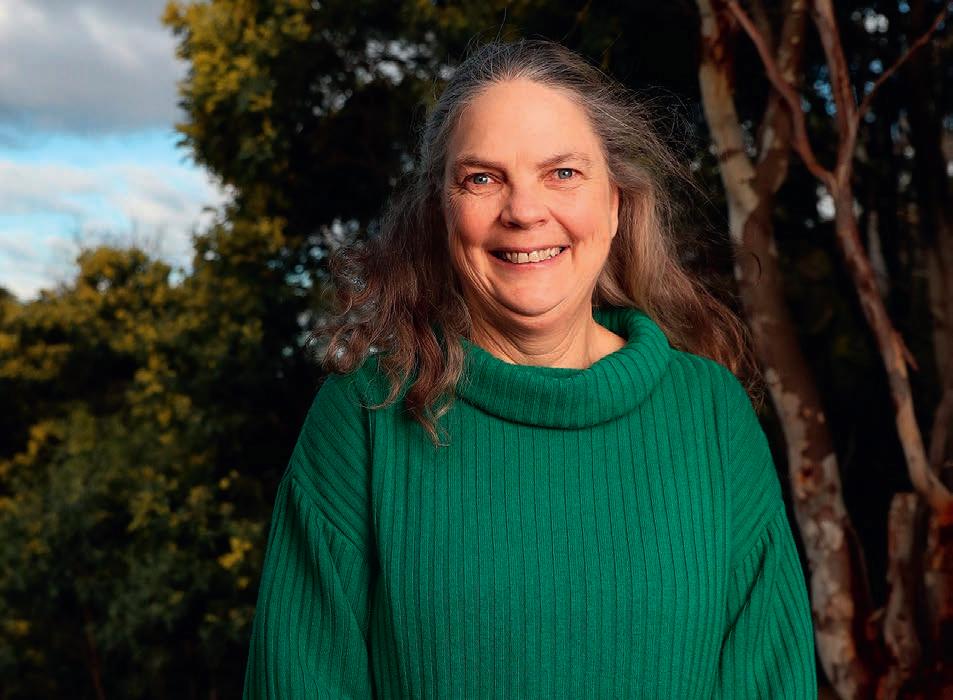
dedicated her life’s research to the quality of the air that we breathe, its consequences and mitigations.
About half the population are at higher risk from harm from air pollution, including those who are younger or older, pregnant, living with a chronic illness or experiencing social disadvantage.
A conservative estimate for the economic costs of premature deaths, increased demands on health services and lost productivity as a result of poor air quality is $10 billion a year in Australia.
The centre will establish state-of-the-art ways to measure and map airborne hazards like air pollution and pollen, identify practical and cost-effective ways to improve the air, and provide robust evidence on interventions to protect those who are most vulnerable when air quality changes.
Menzies Bulletin 1 #0108 Bulletin
About half the population are at higher risk from harm from air pollution
Fresh air: Professor Fay Johnston will lead the Centre for Safe Air.
Photo: Nikki Davis-Jones
It has been immensely satisfying to lead Menzies through a period of growth and consolidation
Director’s message
It’s coming to the end of the year, and as this edition of the Bulletin reaches you we will be welcoming the Sohn Hearts & Minds conference to Hobart.
This is Australia’s leading finance conference, dedicated to supporting medical research, and we are very grateful they have chosen us to be their beneficiary this year.
It is with great pleasure that I introduce you to the new Director of Menzies, Professor Tracey Dickson. Many of you will already know of Tracey and her work in neurodegenerative diseases. Tracey has been a Deputy Director at the Institute and involved with many community events and groups relating to her research expertise in areas such as motor neurone disease and Parkinson’s disease. You will be able to find

out more about Tracey in this edition.
Since I became Director in 2016 it has been immensely satisfying to lead Menzies through a period of growth and consolidation. In that time, we have seen record yearly publications and funding, the establishment of the Multiple Sclerosis Research Flagship and subsequent $10 million in federal government funding, as well as our first commercially licenced research invention, the OxyGenie™, which helps premature babies to breathe. We now have a stronger focus on working in cross-disciplinary teams and developing partnerships outside academia, including with health consumers
and health services, which helps ensure our research meets community needs.
I’m confident that with your continued support, and the dedication of our talented staff and students, Menzies will be in a strong position to deliver on our mission to perform internationally significant medical research leading to healthier, longer and happier lives for Tasmanians. I look forward to continuing my research in an honorary capacity and thank you for your support during my tenure.

L A st ch A nce to pur ch A se Menzies Greetin G cA rds
We are pleased to present our final offerings in the long-running series of the Menzies Greeting Card Collection.
This very special project continued for many years based on our successful ‘Art of Christmas’ program. While we are sorry to see the project end, we are pleased to be able to share with you some of the popular artworks which showcase the talent of local artists.
We want to thank all the artists involved in the Greeting Card Collection over the years – we appreciate your generosity and support. We’d also like to thank our sponsors, who offered their services pro bono to help make the project a success, including The20, Mercury Walch and Winc.
All proceeds from the sale of cards directly support the work of Menzies and can be purchased online at https:// www.menzies.utas.edu. au/get-involved/menzieschristmas-and-greetingcards and in person at Menzies in the Medical Science Precinct at our reception until sold out.
Menzies will be increasingly contacting our supporters via email.
If you would like to provide Menzies with your current email address, please email Menzies.Advancement@utas.edu.au or phone 6226 7707. Thank you.
Popular: The card collection features original artworks kindly donated by acclaimed Tasmanian artists.
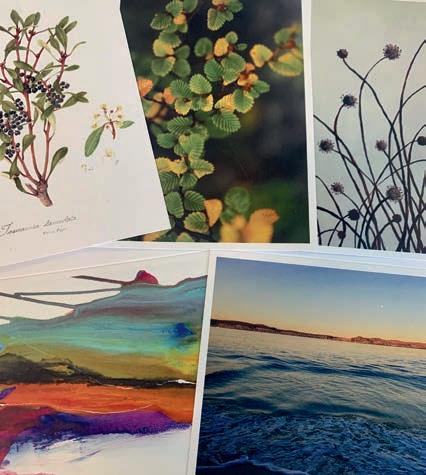
Would you like to keep up to date with the latest Menzies news?
Find us on Facebook and ‘like’ our page.
You can read all our Bulletins and reports electronically at issuu.com
2 Menzies Bulletin
Kind regards, Distinguished Professor Alison Venn Director
Read
Follow us
Keep up with our news
online
New d irector announced for Menzies Institute
Professor Tracey Dickson has been announced as the new Director of the Menzies Institute.
Starting in 2023, Professor Dickson will take over the role from Distinguished Professor Alison Venn who is retiring at the end of this year after leading the Institute for seven years.
Professor Dickson is a neuroscientist who specialises in neurodegenerative diseases such as Parkinson’s disease and motor neurone disease.
to the state to further her career.
She went on to become Deputy Director at Menzies, before being promoted to the role of Associate Dean of Research within the College of Health and Medicine at the University.
Professor Dickson is passionate about connecting Tasmanians to Menzies research, whether it’s in the laboratory, the clinic or the community. She has worked closely with grassroots
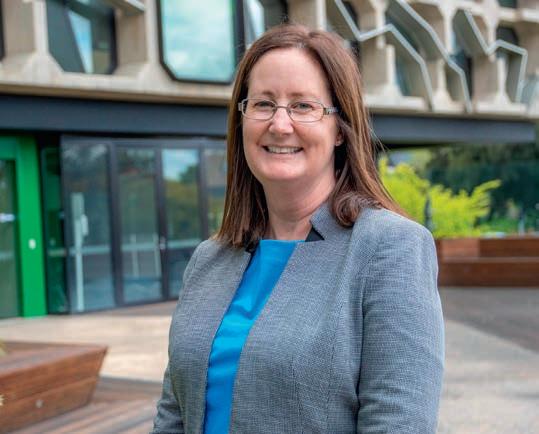
organisations such as Parkinson’s Tasmania and MND Tasmania.
Her vision for Menzies is around partners, people and performance – partnering with the community, funding bodies and health organisations to ensure the impact of research,
August activities around tasmania
Born and raised in Tasmania, Professor Dickson spent several years studying overseas after receiving her PhD, including at the prestigious Mount Sinai School of Medicine in Manhattan, before returning August was packed with community events and activities, giving our researchers the chance to connect with people and share their work.
The annual Beaker Street Festival coincided with National Science Week. The Roving Scientist Bar at the Tasmanian Museum and Art Gallery featured a Menzies corner where people who may not usually get the opportunity to engage with scientists could have a beverage and chat to our medical researchers about what their work involves and what they are passionate about. There were people from Menzies attending at all times throughout the evening, and festival organisers told us the Roving Scientist Bar was one of the most popular parts of Beaker Street.
Then it was onto Agfest where our team pulled on their gumboots and had a range of interesting and interactive activities for the attendees to enjoy.
Our team of neuroscientists set up some “brain craft” for
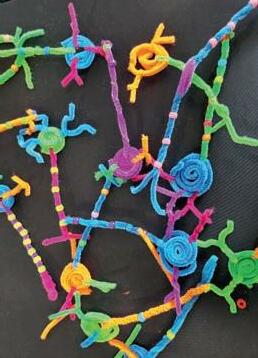
kids and adults alike to get involved with. This included colouring brain hats, making playdough brains and pipecleaner neurons. Our active transport researchers quizzed people on what the most walkable town in Tassie is
and supporting the people at Menzies to do their world-class research and build on the high-performance culture.
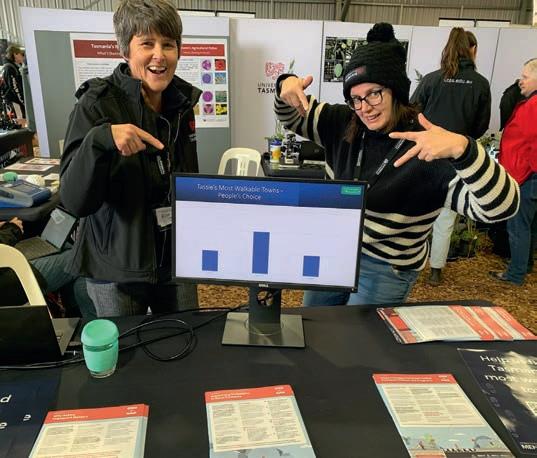
When she’s not working, Professor Dickson enjoys bushwalking and sharing family meals with her husband and three children.
Hands-on: At Agfest, our team of neuroscientists set up “brain craft” for kids and adults alike to get involved with, including pipe-cleaner neurons (above).
and our environmental health scientists played “What’s in the Air?” Bingo.
Thanks to everyone who took part in these community events. We love getting out and about and sharing our work with Tasmanians.
Menzies Bulletin 3
Leader: Professor Tracey Dickson is the new Director of the Menzies Institute.
New le A de RSHI p
professor tracey dickson is passionate about connecting tasmanians to Menzies research
how will you be remembered?
In Memoriam
One sentence in your Will can fund life-saving medical research.
If you would like more information, please contact the Advancement Office on 03 6226 1920.
Bequests save lives by funding research. Thank you.
p restigious Fellowship for p rofessor Bruce Taylor
Congratulations to our Multiple Sclerosis (MS) Research Flagship’s Professor Bruce Taylor, who in October was awarded a prestigious fellowship with the Australian Academy of Health and Medical Sciences.
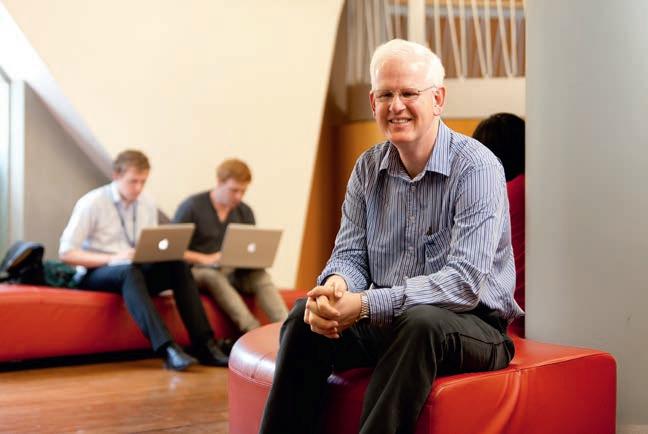
Professor Taylor is a clinicianscientist who leads a large and diverse research group, undertaking internationally significant research in the field of neuroscience. He is also a senior consultant neurologist with a special interest in MS.
Each year, the best and brightest minds in Australia are elected to join the Academy in recognition of their outstanding achievements and exceptional, ongoing contributions in the field of medical and health sciences. Candidates for fellowship must meet certain criteria, including national and international recognition for excellence in health and medical science, contribution to the profession through leadership and mentorship and improving public understanding and promoting health and medical science n the broader community.
Professor Taylor was specifically recognised for how his research has transformed our understanding of MS aetiology, the personal, environmental and genetic factors that contribute to the onset of MS, and why its progression is highly variable. Since his 2007 appointment as a professorial research fellow at Menzies, Professor Taylor has been the recipient of more than 60 grants, including a $2.3 million Investigator Grant from the National Health and Medical Research Council for improving outcomes for people with MS which commenced earlier this year.
We gratefully acknowledge gifts
each year, the best and brightest minds in Australia are elected to join the Academy
Professor Taylor is also co-lead investigator for a phase two clinical trial in which participants receive magnetic brain stimulation (MBS) to non-invasively activate nerve cells in the brain and subtly change their activity. The study team will measure the effect of MBS on MS symptoms including upper and lower limb function, cognition, fatigue, anxiety, depression, sleep and quality of life. They will also use advanced brain imaging techniques such as MRI to assess whether MBS effectively increases brain myelin levels in people with MS.
We gratefully acknowledge gifts made in honour of:
Glenn William Haas
John Mollison Fraser
Menzies Bulletin 4
Honoured: Professor Bruce Taylor has been awarded a prestigious fellowship with the Australian Academy of Health and Medical Sciences.
made from the following estates: Estate of the late Dugald Grant McDougall OAM
Lucy Grace Beswick Kae Elisabeth Campbell Kenneth Dawes
ellow SHI p
F
s upport for world-class research
A recent survey of Menzies donors told us that 70% of respondents give to our work because they want to help support world-class medical research.
It’s true, Menzies research is world-class. Many of our discoveries have led to technologies being used across Australia and around the world, such as innovative methods to help manage breathing in babies in neonatal intensive care. And even though our research is internationally significant, our focus is firmly on the five core research areas that reflect the burden of diseases in Tasmania. One of these includes stroke.
Earlier this year, we wrote to many of you about stroke as part of our Winter Appeal because Tasmania has the highest incidence of stroke per capita in Australia. For this reason, it’s a topic particularly relevant to us, and to many of you, and important that
we have the best researchers working on it. Associate Professor Seana Gall is one such researcher. In addition to being a principal research fellow in cardiovascular epidemiology at Menzies,
Seana leads Australia’s first research program dedicated to stroke prevention – Synergies to Prevent Stroke (STOPstroke) – and is actively involved in public health advocacy.

We will soon launch our Summer Appeal, which aims to raise funds to ensure we can continue to deliver world-class medical research, driven by world-class medical researchers like Seana. Please
look out for it in your mailbox or inbox, or if you prefer you can make a tax-deductible donation at www.menzies. utas.edu.au/donate
And don’t forget, 80% of strokes are preventable; please maintain a healthy weight, stop smoking, avoid alcohol, and keep your blood pressure low. Working together, we can make Tasmania one of the world’s healthiest populations.
Devil in the detail for vaccine and bait trials
Our Tasmanian devil research team has been working for years to develop a vaccine to protect Tasmanian devils from the devil facial tumour (DFT) disease. This disease is an aggressive, transmittable, parasitic cancer that has devastated much of the devil population.
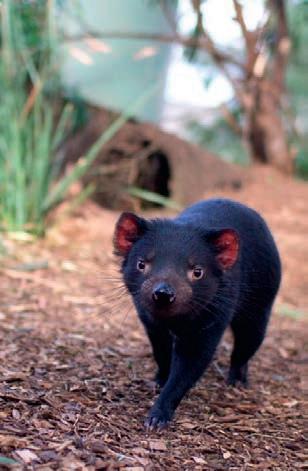
Devil numbers have dropped from 53,000 in 1996 to just 17,000. Our ambitious plan is to develop the vaccine using a similar platform to the AstraZeneca COVID-19 vaccine and distribute it using edible food baits.
The team, led by Dr Andrew Flies and Dr Ruth Pye, has
recently been awarded an Australian Research Council Linkage Project Grant of just over $200,000 to support further development of the devil baits and capacity to monitor vaccine effectiveness in the wild. They are aiming to complete a new devil facility at the Bonorong Wildlife Sanctuary in 2022 to start vaccine trials in 2023. Many members of the community have volunteered to help build the new devil facility and we are grateful for their strong support, and the support of the Save The Tasmanian Devil Appeal that allows our team to continue this exciting and innovative research.
Menzies Bulletin 5
e R A ppe A l
SUMM
Struggling: Tasmanian devil numbers have dropped from 53,000 in 1996 to just 17,000.
Photo: Supplied/ Bonorong Wildlife Sanctuary
Focused: Associate Professor Seana Gall leads Australia’s first research program dedicated to stroke prevention –Synergies to Prevent Stroke (STOPstroke).
don’t forget, 80% of strokes are preventable
dr niamh chapman
postdoctoral researcher
What brought you to Menzies?
I met the Blood Pressure Research Group team at the ARTERY conference in Poland 2015 where I presented work undertaken during a research training year at the Wales Heart Research Institute, Cardiff. The team seemed fabulous and the work was world leading so I knew I wanted to come to Tassie and to Menzies to continue my research
training and start my research career.
What is the focus of your research?
My research is focused on improving the delivery of health services to prevent heart attack and stroke. I work predominantly on the IDEAL study where we have developed a new health service that collects extra health information and measures blood pressure when someone goes to
STAFF p R o FI le
dr
Bill
pathology services to have their cholesterol measured. The extra health information, blood pressure and cholesterol results are used to work out that patient’s risk of heart attack or stroke in the next five years. We are currently testing the service across the state of Tasmania to see if it helps doctors make more informed decisions about patient care to prevent heart attack and stroke thanks to a NHMRC Partnership Grant secured by my supervisor Professor James Sharman.
What are some of the recent findings from this work?
Well, we’ve shown that we can roll this health service out
across the state of Tasmania which was a big step going from the one site we tested in for my PhD. We’ve identified several ways that the service would need to be refined and improved to work in a real clinical setting rather than as a research study and we will use this information along with interviews from doctors, patients and pathology services to try to scale the service nationally if it improves clinical care.
What is the most interesting aspect of this work?
systems. To me, you can’t improve health through health care delivery unless the systems are supporting the people they serve, that includes doctors as well as patients. I love going from smaller in-depth studies using interviews to larger studies where we are taking a broader viewpoint to try to understand a problem from multiple angles to work out solutions.
What do you enjoy doing in your spare time?
dodd
Senior project officer
What brought you to Menzies?
I first came into contact with Menzies as a research participant in the Trips4Health study. This study aimed to test whether public transport incentives increase public transport use and physical activity. Well, it worked for me. I’m now a committed patron of our public transport system and, coincidently, a Senior Project Officer working with HealthxStealth, the Menzies research team responsible for the study.
What is your role within the institute?
My background is in journalism, media and communications, with my PhD exploring ‘solutions journalism’ as it relates to science and sustainability communication in Tasmania. My current role at Menzies is in research translation. Research translation aims to translate new knowledge into evidence-based practice by engaging stakeholders and communicating research for a wide audience.

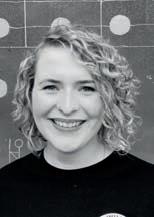
Increasingly, research funding bodies want researchers to translate their research into measurable impact, and my role as a senior project officer involves working with researchers to help them plan, deliver and evaluate research translation efforts. As well as the HealthxStealth team, I am part of a group called the Tasmanian Public Health Action Coalition. This coalition includes Public Health Service policy makers alongside public health researchers across four research domains: tobacco control, air quality, active living and nutrition.
What is the most interesting aspect of this work?
It is a creative challenge to consider all
There are so many interesting parts of my role and research. I love thinking about processes and how people interact with the ways that research can be used and what different people need in terms of communication and engagement to make that knowledge actionable. I have particularly enjoyed working with the creative community in Hobart to help design and deliver public health communication.
What is the part of your work that makes you the proudest?
Seeing evidence based ideas enter the public conversation is always enjoyable.
For example, we know that increasing public transport and active transport use is one of the best (and cheapest ways) of improve physical activity rates and reducing chronic mental and health conditions. But how to
I love going to the beach, experiencing local food and drink delights and live music. We are pretty lucky here in Tassie with all there is to see and do on our doorstep.
encapsulate that idea for a wide audience?
In collaboration with local stakeholders, we designed an animated video that begins with the line, “Every time you leave your car at home you are improving your mental and physical health”. Seeing that idea and animation take on a life of its own online, being shared by a wide range of local stakeholders (including the Department of State Growth) has been especially heartening.
What do you enjoy doing in your spare time?
I am the convenor of Tasmanian Landcare group Claremont Coast Care. I play keyboard for a local band, sing in choirs, play cricket and love spending time with our 15-month old Lori.
Menzies Bulletin 6 p R o FI le
Re S e ARCH e R p R o FI le
details
My
want to invest
Title: Mr Mrs Miss Other Name Address Postcode Telephone ( ) Email Please send me information on remembering Menzies in my Will I have already included a gift to Menzies in my Will Yes, i
in a healthier future for all tasmanians. 100% of your gift will be used for research in Tasmania.
Gifts of $2 and over are tax deductible. or Please accept my one-off gift of: $25 $50 $100 $250 Other $
gift
payment
Please accept my regular monthly gift of: $25 $50 $100 $250 Other $ My
My
Please allocate my gift to: The current Menzies appeal Where most needed A specific area of research
Cheque/money order: Enclosed is my cheque/money order (payable to the Menzies Institute for Medical Research)
Credit card: Please debit my Visa MasterCard Credit card number Name on card Signature Expiry date /


thank you for your support. Donate online You can donate online at menzies.utas.edu.au/donate Donate by phone You can donate over the phone by calling us on 1800 638 124 Menzies Institute for Medical Research University of Tasmania Reply Paid 77465 Hobart TAS 7000 Please post this slip to:














